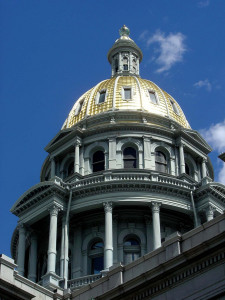This piece is part of the Colorado installment of the “Advocating on the Road” blog series.
By Jack C. Major
Holy Cross Lutheran Church, a congregation of the Evangelical Lutheran Church in America (ELCA)
God saw everything that he had made, and indeed, it was very good (Genesis 1:31).
Holy Cross Lutheran Church of Wheat Ridge, Colorado, was faced with a building infrastructure problem: over 75 percent of the Heating Ventilation and Air Conditioning (HVAC) systems in the church experienced a complete delivery system failure. The property committee noticed that we were starting to use an excessive amount of fresh water every billing cycle. It was leaking out of the radiant floor system and under the foundation, which was washing sand out from under the foundation and causing leaks in the foundation walls.
By the time the property committee realized the extent of the leak in the radiant floor system, we were using an estimated extra 15,000 gallons every three months and the leak had caused damage to the church’s steel tube boiler. In January of 2008, we learned we would need to shut off the entire heating system, except for a single 10-ton rooftop HVAC unit over the large meeting hall and office. The congregation council investigated alternative HVAC systems for the entire church and voted to pursue an option that would help to protect God’s creation — installing a new renewable geothermal HVAC system.
In basic terms, a geothermal HVAC system takes heat from underground wells in the winter and pipes it into our building, and takes the heat from the building in the summer and pipes it back underground. All we are doing is transferring heat from one place to another. By removing and storing solar-generated heat in the earth to heat and cool our church, our geothermal system reduces our use of fossil fuels and at the same time helps to preserve God’s creation for future generations.
My company, Major Geothermal, designed and installed the new system so I know it quite well. It has 14 water-source heat pumps located throughout the building to handle the heating, cooling and ventilation loads. In addition to this, five energy recover units were installed to handle the ventilation loads of the building. For the first time, the new geothermal system brings total comfort to the entire building, including air conditioning and fresh air ventilation to the sanctuary.
This project was made possible through funding from the ELCA Mission Investment Fund. The faith of the Fund’s staff in this project was instrumental to its success, and we were blessed to have their help. Ideally in the future there will be federal and state tax credits or other incentives to encourage these types of investments.
The members of Holy Cross took a huge leap of faith by installing the geothermal system, and by doing this, we have made a profound statement to our community. We are known as a “Green Church” in the Denver metro area; we have many programs and special events to offer ideas to other congregations on how they can also preserve God’s creation.
We continue to look to the future and are currently working on a plan to add solar panels to the church’s roof to further reduce our use of fossil fuels.
May God bless you and yours, as well as the efforts of Christians everywhere to preserve Creation.

